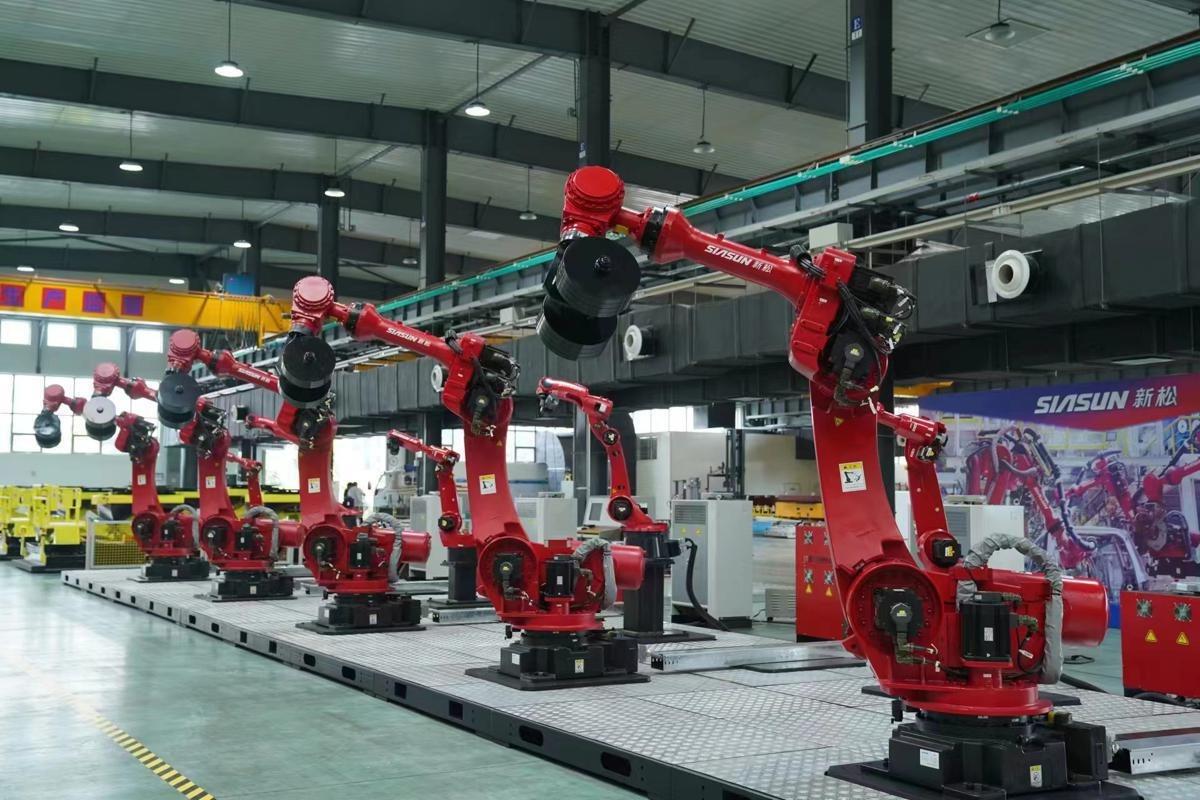 Industrial robots are displayed at Siasun Robot & Automation Co in Shenyang, Liaoning province. (PHOTO PROVIDED TO CHINA DAILY)
Industrial robots are displayed at Siasun Robot & Automation Co in Shenyang, Liaoning province. (PHOTO PROVIDED TO CHINA DAILY)
China's efforts to advance new industrialization and accelerate the establishment of a modern industrial system will not only provide broad space for deeper international cooperation in industrial and supply chains, but also create enormous opportunities for multinational corporations to invest in the country, said government officials and business executives.
They added that scientific and technological innovation will inject strong momentum into China's economic recovery, while foreign companies can play a bigger role in bolstering the high-quality development of the world's second-largest economy.
READ MORE: Advancing new industrialization, modernization
Jin Zhuanglong, minister of industry and information technology, said that China will continue to expand high-level opening-up, implement the measures regarding the complete removal of restrictions on foreign investment in the manufacturing sector and deepen mutually beneficial cooperation with companies across the globe, in order to bolster the optimization and upgrade of industrial and supply chains.
Jin made the remarks on Monday at the China Development Forum 2024 in Beijing, emphasizing that foreign-funded enterprises are playing a vital role in stabilizing China's industrial economy and promoting high-quality development. The two-day forum ended on Monday.
Despite facing mounting uncertainties and challenges, including a complicated and grim external environment, China is willing to work with other countries to establish a global industrial and supply chain system that is secure, stable, smooth, efficient, open, inclusive and mutually beneficial, Jin said.
More efforts will be made to support foreign businesses to establish research and development centers in China, carry out technological research and industrial applications in collaboration with Chinese companies, and expand international cooperation in digital transformation as well as green and low-carbon development of the manufacturing industry, he added.
With its output accounting for more than 30 percent of the global total, China is the world's largest manufacturer, ranking first for 14 consecutive years, according to the ministry.
Ola Kaellenius, Mercedes-Benz Group's chairman of the Board of Management, who attended the forum, expressed the company's commitment to deepening its footprint in China, advancing electric and digital transformation along with Chinese partners, and supporting China's ongoing modernization and the development of new quality productive forces.
"Today, China is not only the largest market for new energy vehicles, but also an innovation hub with industry-leading companies and a mature NEV supply chain. We believe the Chinese market will continue to grow and play a leading role in bringing new innovations to our industry," Kaellenius said.
China has been sending positive signals to advance high-level opening-up in recent years, significantly strengthening the confidence in the market, Kaellenius added.
"The modernization of industrial systems hinges on collaboration and openness," said Stefan Hartung, chairman of the board of management at Robert Bosch, emphasizing that the company remains confident in China's promising business landscape and technological advancements, and stands poised to contribute to the evolution of a modern industrial system.
Bosch, as one of the first foreign companies to invest in China, has witnessed rapid growth alongside local partners and customers. Currently, the German company has a robust presence, boasting 34 manufacturing sites and 26 research and development centers in the Chinese market.
Moreover, innovative digital technologies including 5G, big data and artificial intelligence have been increasingly applied to bolster the digital transformation and upgrade in traditional industries, and to speed up the building of a modern industrial system.
Liu Liehong, head of the National Data Administration, said at the forum that to further propel the deeper integration of digital technologies with real economy and unleash the value of data resources, the country will step up efforts to improve the basic system for data elements, expand the industrial application scenarios of data and accelerate the construction of digital infrastructure such as computing networks.
ALSO READ: Hubei advances scientific and technological innovation
Liu also stressed the need to promote and standardize cross-border data flow, work with major economies worldwide to establish a cooperation mechanism concerning cross-border data flow, and participate in the formulation of global digital rules to expand high-level opening-up in the data domain.
Denis Depoux, global managing director of consultancy Roland Berger, said foreign enterprises have been and will hopefully remain key contributors to China's industrial modernization drive, particularly in areas like automation and digitalization of industrial and supply chains, where multinationals have strong positions globally, including in China.
Li Dongsheng, founder and chairman of Chinese consumer electronics maker TCL Technology Group, called for strengthening exchanges and cooperation with foreign counterparts to bolster the digitalization of China's manufacturing sector, exploring mutually beneficial and orderly international rules related to digital economy, and expanding cooperation in the intellectual property rights of digital transformation.


